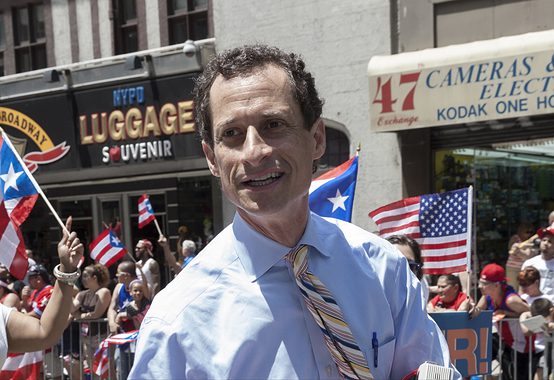From Gifted Politician to Punchline

As he sat on his cluttered campaign desk on the morning of July 23, 2013, Anthony Weiner ignored the shrill ring of his office landline and stared blankly at the ground. His mouth was set in an expressionless line, with no sign of the smug yet playful grin he typically wore. His life was crashing, and the flames threatened to engulf the professional aspirations of his brilliant and glamorous wife, Huma Abedin.
This was, as Josh Kriegman and Elyse Steinberg’s fly-on-the-wall documentary Weiner reminds us, a dramatic change in fortune for the former U.S. congressman. The first leg of his New York City mayoral campaign, from April to June, had been a success—one so remarkable that even his most loyal supporters had to confess their bewilderment. His considerable standing in the polls, initially dismissed by the pundits as a temporary mark of the name recognition brought by his 2011 sexting scandal (which had led him to resign from Congress), only grew stronger as the campaign progressed. By mid-July, Weiner led or was virtually tied with chief rival Christine Quinn in all recent public surveys. Bill de Blasio was at this point an afterthought.
Having pictures of his penis circulated around the world had a liberating effect on Weiner’s politics. After his 2011 scandal, Weiner was ostracized by party elites. With little prospect of endorsements from the Democratic interest groups that traditionally dominated the nominating process, Weiner was compelled to campaign directly to the people. And they were receptive to his combative, off-the-cuff rhetoric, while taking a much more charitable view of his scandal than media and political elites did.
When Republican rival George McDonald denounced Weiner at a candidates’ forum in a tone of exaggerated outrage, he was shouted down by the mass of the assembled crowd. And Weiner’s appearance at the annual NYC gay-pride parade was a palpable success. As he bounded around the assembled crowd, wildly waving a giant rainbow flag, invigorated gay supporters excitedly chanted his name.
Weiner ran an issues-oriented campaign that defied party orthodoxy on topics like health care, where he proposed a public option for residents of New York City. Freshly alienated from party leaders, he directed his impressive capacity for moral indignation—which had mostly been confined to Weiner’s Republican colleagues while he was in Congress—to fellow Democrats who broke with progressive values or the public interest. When Quinn challenged him on his sexting scandal, he gamely deflected the underlying issue of truthfulness, noting that she had gone back on her word by voting to allow Michael Bloomberg to seek an unprecedented third term in Gracie Mansion. Voters were enthusiastic—on July 23, 2013, a Quinnipiac poll showed Weiner leading Quinn by four points.
Of course, this was the day the second sexting scandal erupted. Leaks from one of Weiner’s sexting partners, a single-minded fame-seeker who is actually named Sydney Leathers, proved that Weiner’s X-rated photography had persisted well past his resignation. Weiner’s body language that morning indicates that he may have known it was over.
Yet he plowed on to the end, and showed incredible discipline in the process. Whenever he hit the campaign trail after July 23, Weiner found himself sandwiched between international tabloid journalists attacking his character and credibility. And he couldn’t walk a block without being heckled by an onlooker with a penis joke. But except for his undignified meltdown on the The Last Word with Lawrence O’Donnell a day before the election—prompted by a series of questions whose only purpose was to ridicule and provoke him—he stayed on message throughout the campaign.
He showed up on the campaign trail every day and, with evident gusto, continued to answer questions from constituents, argue for his policy proposals, and criticize the record of his opponents while contritely apologizing for his sexting whenever the issue arose (which was every other minute). He had to do all of this without help from his wife, who virtually vanished from the campaign trail after vouching for her husband’s integrity in an uncouth, hastily arranged press conference on July 23.
Weiner prompts the question: How can someone with such mental toughness be so stupid and reckless? There is of course no satisfying answer. But the film is a useful and compelling case study of a person’s ability to be at odds with himself.
The weak point in Weiner’s narrative is its painfully myopic depiction of Abedin. Everything she does in the film—aggressively campaigning and fundraising for her husband before July 23 and going out of her way to shirk campaign duties thereafter—relates to her husband. True, Weiner is about him, not her. But spending a few minutes of screen time developing Abedin as an individual and relaying her pre-Weiner life story would have added more dramatic import to Weiner’s second betrayal.
Nevertheless, Kriegman and Steinberg deserve credit for accessing this fascinating case study and distilling it down to the essentials (the film is only 96 minutes). They should also be applauded for confining discussions of Weiner’s sexting to the details needed to advance their narrative.
I am probably most relieved that, in examining Weiner’s shortcomings, Kriegman and Elyse refrained from the moral preening (much of it hypocritical) that characterizes public discussion of the gifted politician who will live the rest of his life as a punchline.
Matt Cockerill is a lawyer and freelance writer from Chicago.